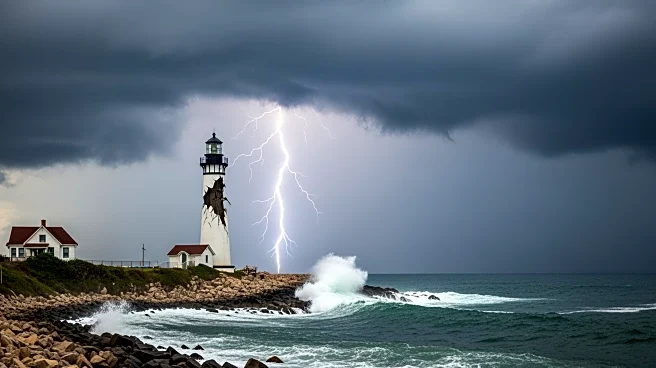What's Happening?
Hurricane Melissa, which made landfall on Jamaica on October 28, has been recorded as one of the most powerful hurricanes to hit the island in 75 years. The storm has tied with the 1935 'Labor Day' hurricane as the strongest Atlantic hurricane to make
landfall, with sustained winds reaching 185 miles per hour. The hurricane has resulted in at least 50 reported deaths and caused damages estimated to exceed $50 billion. Satellite images from Vantor Technology have revealed extensive destruction across Jamaica, with many areas left unrecognizable due to flooding and high winds. Vantor has made these images available to aid rescue and recovery efforts, allowing responders to identify the most severely impacted areas and allocate resources effectively.
Why It's Important?
The impact of Hurricane Melissa is significant not only due to the immediate loss of life and property but also because of the long-term economic and social challenges it poses for Jamaica. The estimated $50 billion in damages represents a substantial economic burden for the island nation, potentially affecting its infrastructure, tourism industry, and overall economic stability. The availability of satellite imagery plays a crucial role in disaster response, enabling efficient allocation of resources and aiding in the coordination of rescue operations. The storm's unprecedented strength highlights the increasing severity of weather events, possibly linked to broader climate change trends, which could have implications for future disaster preparedness and policy-making in the region.
What's Next?
As recovery efforts continue, the focus will likely shift to rebuilding and strengthening infrastructure to withstand future storms. International aid and support may be necessary to assist Jamaica in its recovery, and there could be increased discussions on climate resilience and adaptation strategies. The use of satellite technology in disaster response may also see further development and integration into emergency management practices. Additionally, the event may prompt a reevaluation of building codes and urban planning in hurricane-prone areas to mitigate future risks.
Beyond the Headlines
The devastation caused by Hurricane Melissa underscores the ethical and humanitarian responsibilities of the global community in addressing climate change and supporting vulnerable regions. The storm's impact may lead to increased advocacy for climate justice and equitable resource distribution to help nations like Jamaica adapt to and recover from such catastrophic events. Furthermore, the role of technology in disaster management could see advancements, with a focus on improving real-time data sharing and enhancing predictive models to better prepare for future natural disasters.

















